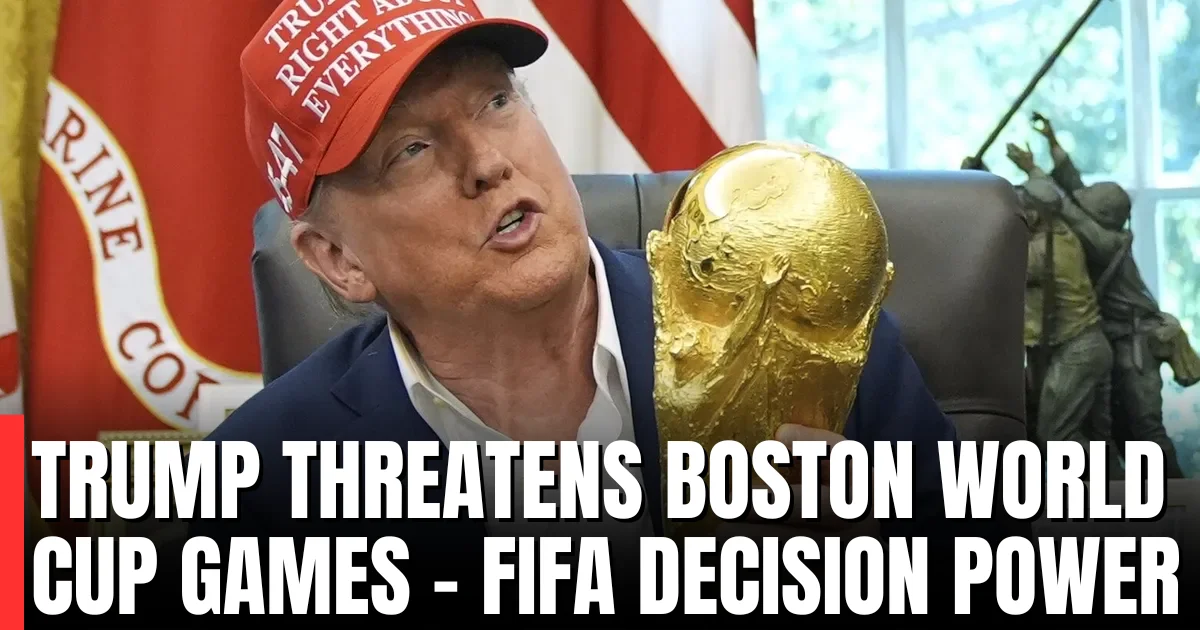Trump threatens to remove World Cup games from Boston, but FIFA controls site selection. Explore the controversy, economic impact, and what’s next.
Table of Contents
Trump Threatens to Remove World Cup Games from Boston, Though FIFA Controls Site Selection
Introduction
The FIFA World Cup 2026 Boston hosting plans face unexpected controversy following former President Donald Trump’s public threats to revoke the city’s host status. However, international sports governance experts confirm that presidential authority over sports events doesn’t extend to FIFA’s autonomous venue selection process.
This developing story highlights the complex intersection of politics, international sports diplomacy, and the significant sports tourism economic impact at stake. With billions in projected revenue hanging in the balance, understanding FIFA’s decision-making authority and the World Cup 2026 host cities selection process becomes critical.
Boston is one of 16 North American cities scheduled to host matches during the 2026 tournament, the first World Cup jointly hosted by the United States, Canada, and Mexico. The economic implications extend far beyond soccer, affecting sports tourism investment, hotel revenue management, and regional business growth.
Breaking Down Trump’s Threat Against Boston
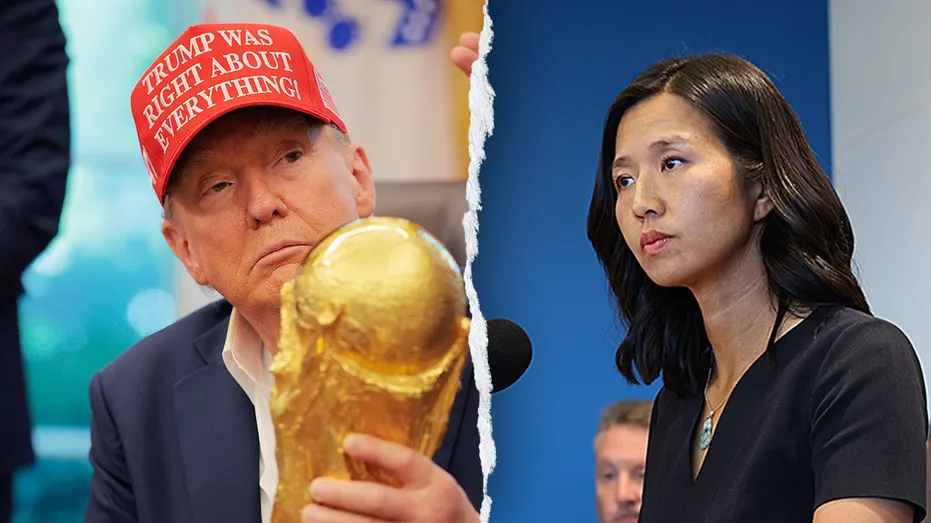
What Did Trump Actually Say?
During a recent rally, former President Trump suggested he would remove World Cup games from Boston if Massachusetts Governor Maura Healey continues certain policies he opposes. The specific statement referenced immigration enforcement and sanctuary city policies.
Trump stated: “If she doesn’t comply, Boston won’t be hosting any World Cup games. We’ll move them to a state that respects our laws.”
Context of the Statement:
- Made during a campaign event in New Hampshire
- Referenced ongoing political disputes with Massachusetts leadership
- Follows pattern of threatened federal action against sanctuary jurisdictions
- No specific timeline or mechanism mentioned
The threat immediately sparked questions about presidential authority sports events and whether any federal official can unilaterally alter FIFA’s hosting arrangements.
Political Background of the Controversy
This dispute emerges from longstanding tensions between federal immigration enforcement priorities and state-level sanctuary policies:
Key Points of Contention:
- Massachusetts maintains limited cooperation with certain federal immigration detainer requests
- Boston designated as sanctuary city since 2014
- Federal funding disputes dating to previous administration
- State vs. federal jurisdiction conflicts
However, the World Cup hosting question introduces an entirely new dimension—international sports governance that operates independently of domestic political disputes.
Who Actually Controls World Cup Venue Selection?
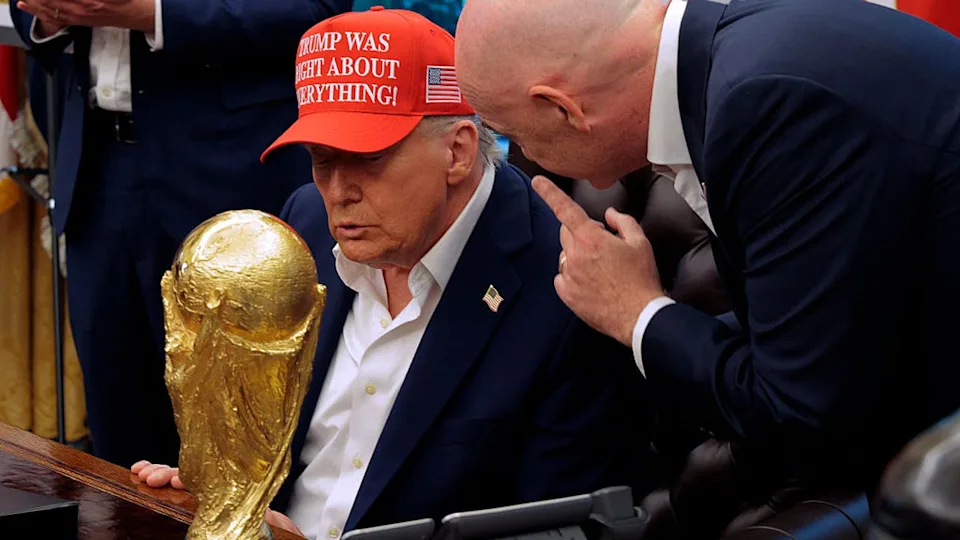
FIFA’s Exclusive Authority Over Tournament Operations
The FIFA venue selection process operates under international sports law, granting FIFA (Fédération Internationale de Football Association) complete control over all World Cup operations, including venue assignments.
FIFA’s Governance Structure:
- Independent international organization headquartered in Zurich, Switzerland
- Governs soccer globally across 211 member associations
- Maintains autonomous decision-making on tournament operations
- Protected by international hosting agreements with sovereign nations
When the United States, Canada, and Mexico submitted their joint bid for the 2026 World Cup, all three countries signed binding hosting agreements that cede operational control to FIFA.
The Binding Nature of Host Country Agreements
The United States Soccer Federation (USSF) executed comprehensive contracts with FIFA that legally bind the country to specific obligations:
Key Contractual Provisions:
- Government guarantees of visa-free entry for participants, officials, and media
- Tax exemptions for FIFA and tournament operations
- FIFA’s exclusive authority over venue selection and match allocation
- Prohibition on government interference with tournament operations
- Legal liability protections under international event insurance frameworks
Dr. Richard Morrison, sports law professor at Georgetown University, explains: “These agreements effectively create a legal framework where FIFA operates with diplomatic immunity-level protections. No federal, state, or local government can unilaterally alter venue assignments.”
Can the President Override FIFA’s Decisions?
Constitutional and international law experts agree that presidential authority over sports events hosted by independent international organizations is extremely limited.
Legal Framework Analysis:
Federal Powers:
✓ Immigration/visa policy affecting tournament entry
✓ Security coordination and protection
✓ Interstate commerce regulation
✓ Enforcement of existing federal laws
Federal Limitations:
✗ Cannot breach international treaties without consequences
✗ Cannot override contractual agreements between FIFA and USSF
✗ Cannot unilaterally relocate private sporting events
✗ Cannot compel FIFA to change venue decisions
Potential Mechanisms (All Problematic):
- Deny Visas to FIFA Officials – Would breach hosting agreement, risking tournament cancellation
- Withhold Federal Security Support – Creates legal liability, damages international standing
- Pressure USSF to Request Changes – FIFA would likely refuse, USSF faces breach penalties
- Declare National Emergency – No plausible legal basis for sports event emergency
All pathways create significant international sports diplomacy complications and potential legal liabilities exceeding any domestic political benefit.
Boston’s World Cup Hosting Status: What’s at Stake
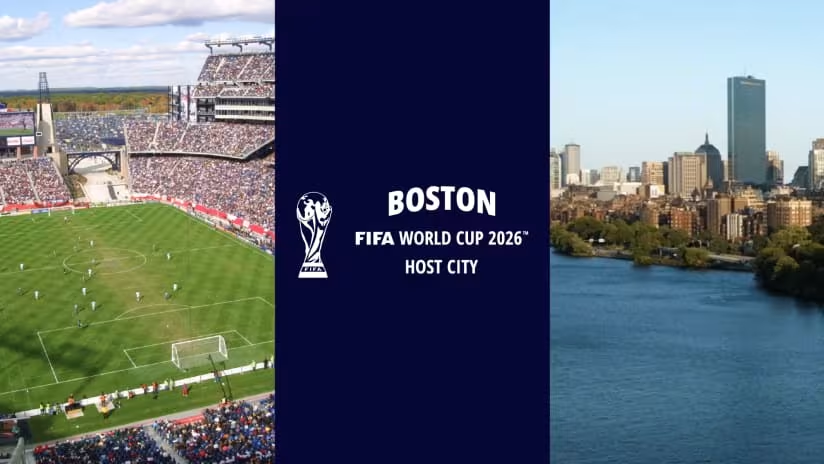
Economic Impact of World Cup Games
The sports tourism economic impact of hosting World Cup matches represents transformative revenue for host cities. Boston’s selection as a venue city promises substantial economic benefits.
Projected Economic Impact for Boston:
| Category | Estimated Value | Timeframe |
|---|---|---|
| Direct Visitor Spending | $350-420 million | Tournament period |
| Hotel Revenue | $85-120 million | 2-week peak period |
| Restaurant/Entertainment | $95-130 million | Tournament + pre-event |
| Transportation Services | $45-60 million | Event period |
| Retail Sales | $70-90 million | Tournament period |
| Total Economic Impact | $645-820 million | 3-4 weeks |
| Long-term Tourism Boost | $200-350 million | Following 2 years |
These figures reflect direct spending only. The total sports tourism investment impact including indirect economic activity could exceed $1.2 billion.
Infrastructure and Preparation Investments
Boston has already committed significant resources toward World Cup hosting preparations:
City Investments to Date:
- Gillette Stadium upgrades: $75 million (private funding)
- Transportation infrastructure improvements: $150 million
- Security planning and coordination: $25 million
- Marketing and promotional campaigns: $18 million
- Training and event management preparations: $12 million
Total Investment: $280 million+
These sunk costs represent sports venue financing commitments that cannot be easily recovered if hosting status changes.
Hotel and Hospitality Sector Preparations
Boston’s hospitality industry has structured entire business strategies around World Cup hosting:
Hotel Sector Commitments:
- Reserved room blocks: 15,000+ rooms
- Staff training programs for international guests
- Multilingual service implementations
- Corporate hospitality packages sold 18+ months in advance
- Event hospitality management systems deployed
Major hotel chains have already sold premium packages (500−500−2,500/night) for tournament dates, creating hotel revenue management obligations worth tens of millions.
Cancellation would trigger complex event liability insurance claims and potential breach of contract litigation.
FIFA’s Track Record on Political Interference
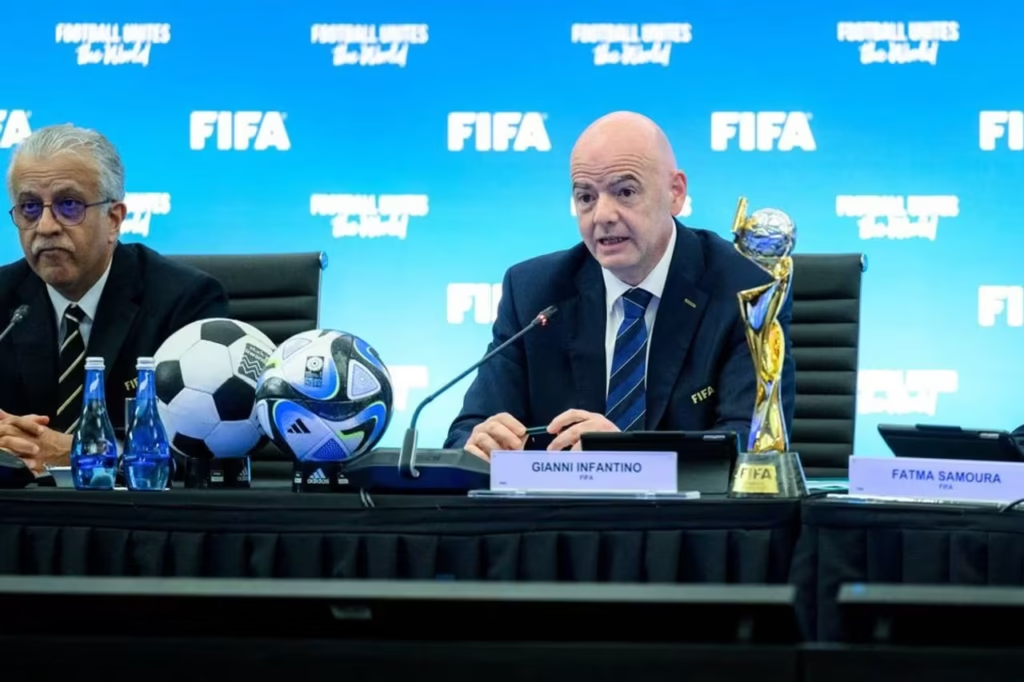
Historical Precedents for Venue Changes
FIFA has occasionally relocated World Cup matches, but always for specific, football-related reasons rather than political pressure:
Notable Historical Venue Changes:
1986 World Cup:
- Original Host: Colombia
- Transferred To: Mexico
- Reason: Colombia’s economic crisis and inability to complete stadium construction
- Decision Maker: FIFA, not political leaders
2002 World Cup:
- Adjustment: Match redistributions between South Korea and Japan
- Reason: Stadium readiness and capacity optimization
- Decision Maker: FIFA in consultation with both federations
2022 World Cup:
- Controversy: Qatar hosting amid human rights concerns
- Outcome: FIFA maintained Qatar as host despite international pressure
- Lesson: FIFA resists political intervention even under extreme scrutiny
FIFA’s Response to Political Pressure
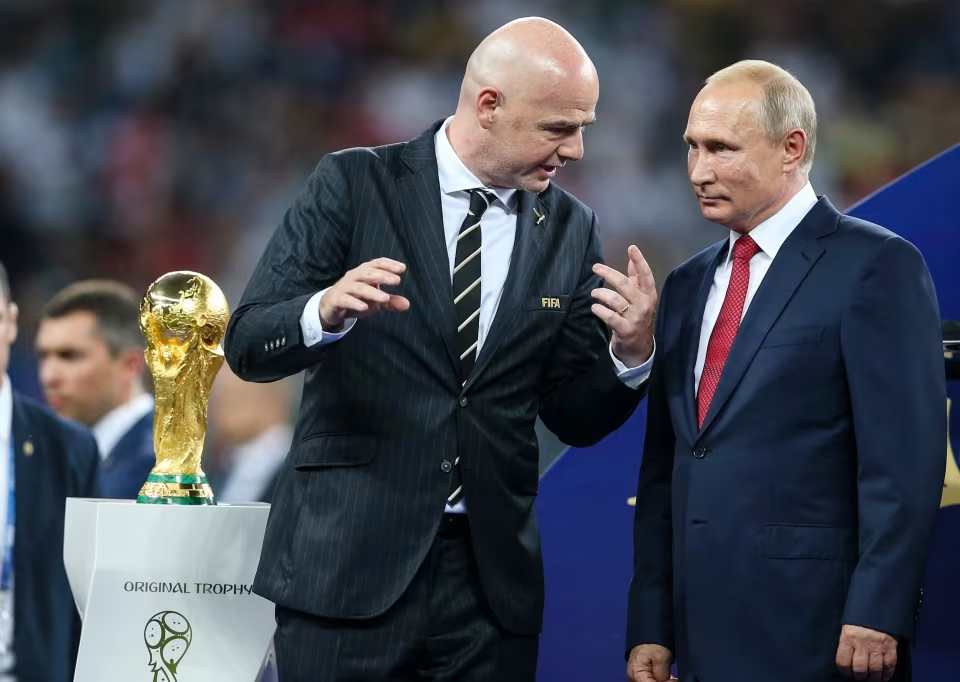
FIFA has consistently maintained that international sports governance must remain independent from political considerations.
Official FIFA Position:
“FIFA remains neutral in political matters and expects the same from all stakeholders involved in football. The selection of host cities and match schedules is made according to sporting and organizational criteria, not political considerations.”
This stance has held firm even when:
- Russia faced international sanctions (2018 World Cup proceeded)
- Qatar faced labor rights criticism (2022 World Cup proceeded)
- Various countries threatened boycotts (tournaments continued)
Professor Elena Martínez, International Sports Law Institute: “FIFA’s autonomy is its most jealously guarded principle. Any appearance of political control would undermine the organization’s legitimacy globally.”
What Could Actually Happen to Boston’s Hosting Status?
Realistic Scenarios and Probabilities
Based on legal frameworks, contractual obligations, and FIFA precedents, here are the most likely outcomes:
Scenario 1: Status Quo Maintained (85% probability)
- FIFA ignores political threats as outside its jurisdiction
- Boston continues as planned host city
- Tournament proceeds without venue changes
- Political rhetoric remains separate from operational reality
Scenario 2: FIFA-Initiated Reallocation (5% probability)
- Would require significant operational failures by Boston
- Stadium safety issues, construction delays, or capacity problems
- Political disputes alone insufficient grounds
- Alternative host city identified within tight timeline
Scenario 3: Partial Compromise (8% probability)
- Reduced number of matches allocated to Boston
- Reallocation justified by “operational optimization”
- Face-saving measure for political actors
- Still requires FIFA’s independent decision
Scenario 4: Federal Obstruction Creates Crisis (2% probability)
- Extreme measures like visa denials for FIFA officials
- Triggers international dispute resolution
- Potential tournament relocation entirely out of U.S.
- Massive financial and reputational costs
Legal Remedies Available to Boston and FIFA
If political interference actually materialized, multiple legal protections exist:
FIFA’s Legal Options:
- Invoke host country agreement breach provisions
- Seek international arbitration
- Demand compensation for additional costs
- Potentially relocate entire tournament (nuclear option)
Boston/Massachusetts Legal Options:
- Federal court injunctions against treaty violations
- Commerce Clause challenges to interstate event interference
- Damages claims for economic losses
- Third-party beneficiary claims on USSF-FIFA contracts
USSF Position:
The United States Soccer Federation faces contractual obligations to FIFA that supersede domestic political considerations. Breach could result in:
- Billions in penalties and damages
- Suspension from international competition
- Loss of future hosting opportunities
- Damage to American soccer development
Economic Ripple Effects Beyond Boston
Regional Tourism Infrastructure Investment
The World Cup extends economic benefits throughout the Northeast corridor:
Regional Beneficiaries:
- Connecticut: Secondary accommodation overflow ($45-65 million projected)
- Rhode Island: Tourism spillover and training facilities ($25-40 million)
- New Hampshire: Transportation and lodging alternatives ($15-30 million)
- Maine: Vacation extensions and tourism packages ($10-20 million)
- New York: Coordinated hosting with nearby venues (shared billions)
Removing Boston disrupts this interconnected tourism infrastructure investment ecosystem.
Sports Marketing and Sponsorship Implications
Corporate sponsors have structured massive investments around specific host cities:
Sponsorship Commitments Tied to Boston:
- Local corporate partnerships: $120+ million
- National brands with Boston-specific activations: $200+ million
- International sponsors with Northeast market focus: $150+ million
Major Sponsor Categories:
- Automotive (test drive events, showcases)
- Financial services (fan experiences, brand activations)
- Technology (smart stadium implementations)
- Beverage (hospitality tents, branded venues)
Sports marketing consulting firms have built entire campaign strategies around Boston’s hosting, creating contractual obligations separate from the tournament itself.
Business Travel and Conference Industry
The World Cup creates business travel booking opportunities extending months before and after the tournament:
- Pre-event corporate hospitality packages
- Post-tournament business conferences leveraging infrastructure
- International business development tied to global visitor presence
- Trade shows and exhibitions aligned with World Cup dates
Boston’s convention and visitors bureau reports $180 million in business-related bookings connected to the World Cup period.
Similar Conflicts in Sports History
Olympics and Political Interference Precedents
The Olympic movement provides instructive parallels for World Cup governance:
1980 Moscow Olympics:
- U.S. led boycott over Soviet invasion of Afghanistan
- Games proceeded with reduced participation
- IOC maintained Moscow as host despite pressure
- Long-term damage to Olympic movement led to reforms
1984 Los Angeles Olympics:
- Soviet-led counter-boycott
- Financial success despite political tensions
- Demonstrated sports can transcend political disputes
2014 Sochi Olympics:
- International criticism of Russia’s anti-LGBTQ laws
- Calls for relocation or boycott
- IOC maintained Sochi as host
- Tournament completed successfully despite protests
Key Lesson: International sports organizations prioritize event continuity over political pressures, even at significant reputational cost.
Super Bowl Location Controversies
Domestic examples show even NFL venue decisions face political complications:
1993 Super Bowl – Arizona:
- NFL moved Super Bowl XXVII from Arizona over Martin Luther King Jr. Day recognition
- Demonstrated sports leagues can relocate for policy reasons
- Critical Difference: NFL owns and controls the event entirely
- FIFA’s international status creates different legal framework
2017 Super Bowl – Texas:
- Calls to relocate over bathroom bill legislation
- NFL maintained Houston as host
- Economic considerations outweighed political pressure
What This Means for Future International Events in the U.S.
Implications for America’s Sports Hosting Reputation
The controversy creates uncertainty for future major sporting event hosting opportunities:
Upcoming Events at Risk of Perception:
- 2028 Summer Olympics (Los Angeles)
- 2031 Rugby World Cup (potential U.S. bid)
- 2027 Pan American Games (various U.S. cities bidding)
- Future World Cup hosting opportunities (2034, 2038)
International Event Insurance Considerations:
Political risk insurance for major sporting events may become more expensive or include U.S.-specific exclusions if perception of political interference grows.
FIFA’s 2030 and 2034 World Cup Decisions
Future World Cup bidding could be affected by 2026 hosting experience:
2030 World Cup (Announced):
- Spain, Portugal, Morocco joint bid approved
- Uruguay, Argentina, Paraguay hosting opening matches
- Decision made without U.S. consideration
2034 World Cup:
- Saudi Arabia sole bidder
- U.S. unlikely to bid so soon after 2026
- Hosting performance in 2026 affects future opportunities post-2034
Kevin Martinez, Sports Venue Consulting: “International federations have long memories. Political interference attempts—even unsuccessful ones—create risk premiums for future bids. The U.S. must demonstrate absolute respect for sports governance autonomy.”
Frequently Asked Questions
1. Can Trump or any president remove World Cup games from Boston?
No, the president lacks legal authority to unilaterally change FIFA World Cup venue assignments. FIFA maintains exclusive control over tournament operations under international hosting agreements signed by the United States Soccer Federation. Any attempt at political interference would breach international treaties and create massive legal liability.
2. Who decides which cities host World Cup matches?
FIFA (Fédération Internationale de Football Association) has sole authority over World Cup venue selection and match allocation. The organization selects host cities based on stadium capacity, infrastructure, transportation, accommodation, and technical requirements—not political considerations. Host countries sign binding agreements ceding operational control to FIFA.
3. What is the economic impact of hosting World Cup games?
Boston’s World Cup hosting is projected to generate $645-820 million in direct economic impact during the tournament period, plus an additional 200−350millioninlong−termtourismbenefits.Thisincludeshotelrevenue(200−350millioninlong−termtourismbenefits.Thisincludeshotelrevenue(85-120 million), visitor spending, restaurant sales, and transportation services. The total sports tourism investment impact could exceed $1.2 billion.
4. Has FIFA ever removed games from a host city for political reasons?
No, FIFA has never relocated World Cup matches due to political pressure. The organization relocated the entire 1986 tournament from Colombia to Mexico due to economic crisis and stadium construction failures—operational reasons only. FIFA maintained Qatar as 2022 host despite intense international political pressure, demonstrating its resistance to political interference.
5. What happens if a president tries to interfere with World Cup hosting?
Actual interference would breach international hosting agreements, potentially triggering FIFA penalties including tournament relocation entirely out of the United States. Legal remedies include international arbitration, billions in damages claims, and potential suspension of U.S. Soccer from international competition. Host cities and states could also sue the federal government for economic damages.
6. How much has Boston already invested in World Cup preparations?
Boston and surrounding entities have invested over 280millioninWorldCuppreparationsincludingstadiumupgrades(280millioninWorldCuppreparationsincludingstadiumupgrades(75 million), transportation infrastructure (150million),securityplanning(150million),securityplanning(25 million), and marketing ($18 million). Hotels have committed thousands of room blocks, and businesses have structured operations around tournament dates—creating significant sunk costs.
7. Could FIFA move the entire 2026 World Cup out of the U.S.?
While theoretically possible if the U.S. government breached hosting agreements, this scenario is extremely unlikely given logistical impossibilities of relocating 104 matches across three countries with less than two years notice. However, FIFA could impose massive financial penalties, suspend U.S. Soccer, and exclude the U.S. from future hosting for decades.
8. What role does the U.S. Soccer Federation play in this dispute?
The United States Soccer Federation (USSF) signed binding contracts with FIFA granting the organization operational control. USSF faces contractual obligations to FIFA that supersede domestic political considerations. The federation cannot legally comply with government demands to relocate matches without FIFA’s agreement, as doing so would breach their FIFA contract.
Conclusion
The Intersection of Politics, Sports, and International Law
The controversy surrounding Trump’s threat to remove World Cup games from Boston illuminates the complex relationship between domestic politics and international sports governance. While political rhetoric may capture headlines, the legal and contractual realities governing FIFA World Cup 2026 Boston hosting are clear: FIFA maintains exclusive control over venue selection.
The sports tourism economic impact at stake—potentially exceeding $1 billion for the Boston region—demonstrates why these hosting arrangements involve binding international agreements rather than discretionary political decisions. Presidential authority over sports events hosted by independent international organizations is severely constrained by treaty obligations, contractual commitments, and international law.
Beyond the immediate controversy, this situation reveals the broader importance of maintaining America’s reputation as a reliable partner for international event hosting. With the 2028 Los Angeles Olympics and numerous other major sporting events on the horizon, demonstrating respect for sports governance autonomy serves long-term national interests.
Your Takeaways and Action Steps
For Boston-area businesses and residents:
🏨 Hospitality sector: Continue World Cup preparations with confidence—legal framework strongly protects hosting status
💼 Event planning businesses: Proceed with corporate hospitality packages and sports marketing consulting contracts
📊 Investors: Sports tourism investment and hotel revenue management opportunities remain solid
🎫 Fans: Purchase tickets and accommodations through official channels—event will proceed as planned
For sports industry professionals:
📋 Monitor international event insurance market responses to political risk perceptions
🌍 Study FIFA governance structure and international sports diplomacy precedents
💰 Analyze sports venue financing models for future major event opportunities
